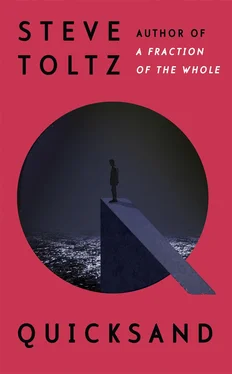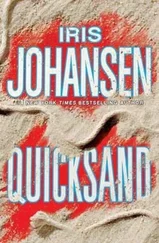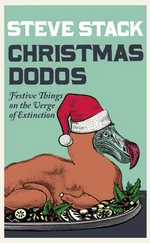Draw thy breath in pain, to tell my story
Hamlet
A Plague of Isolated Cases
It is summer in Sydney. Cherries, pawpaw, mangoes and watermelon render apples, bananas and oranges the most banal-tasting objects ever to set foot in a human mouth; waves foreclose on children’s sandcastles; shopping-centre Christmas decorations hang tackily over swarthy Santas with heat exhaustion; bushfires rage out of control and everywhere is ash, and a burning red moon of a bushfire night hangs over the city, over the ocean, over Aldo ripening like garbage on his dreary rock.
Magic Beach is overrun, blighted with onlookers who stumble down the hazardous descent to gawk at the muse, the paraplegic, the poet, the rapist, the murderer, the religious entrepreneur and false prophet sequestered on the rock; his congregation is made up of girls tanning their fake tans, hirsute men so incurious they don’t know what their own tattoos mean, flaxen Scandinavian backpackers with actual snouts, Chinese tourists, nudists splayed limply on the sand as if they’ve been blown out of a whale’s spout, members of the Association of Sex Workers, spliff-smoking truants who have biked unhelmeted down the near-vertical slope, occupational therapists and their clients, tween sexual autodidacts, bloggers, reality-TV stars, septuagenarian snorkellers, the unemployed and underemployed, white and off-white supremacists, PR companymen attempting to persuade Aldo to endorse this or that brand of energy drink, stoners, locals, local politicians hoping for photo opportunities, and parents scrambling to reclaim children who dared each other to swim out and touch the hermit in an increasingly popular game called Escape from Paedophile Island.
They all huddle on the shoreline, squinting out over the seasick-green sea, shielding their eyes in his direction, as if he were a precious jewel heavily guarded by three-foot waves on endless patrol. The surfers don’t know what to think. Breasts are flashed, penises fetched from inside speedos, stereo speakers blare discordantly. People sneak onto the rock with offerings: flowers, a cat afraid of water, pornography, cakes, Kentucky Fried Chicken, gas lanterns, throw cushions, dripping gelatos, cases of beer, an issue of Waves magazine delivered by the local newsagent himself. An Indian man has set up a kiosk on the beach hawking binoculars. At night, torches probe the quiet darkness. Aldo is beset from the ocean side too: dinghies are launched from God knows where, the clatter of outboard engines throttling near the rocks; wooden yachts with blaring neon lights drift by nightly. All these people are wondering, perhaps, what goes through the mind of this swarthy guru given legitimacy through suffering as he moves occasionally naked around that tiny, desolate, gull-sick island. Who knows what he thinks of the world, weakened by distance and seen through a sheen of salty air; who knows if the endless sea looks to him like a desert or a long, flowing oasis when he wakes up drooling on a pillow of moss, frozen and covered in dew, back aching, neck and shoulders hurting in newfound ways; who knows what runs through his mind when he is beset by a plague of winds, a militia of waves, a cancer of sunbeams, looking dumbly at his wheelchair from the rock as people sit on it, birds shit on it, rain falls on it; who knows what the hell he’s thinking when he swivels to gaze at the stringybarks canted at 45-degree angles, or at the sandstone ridges, or the steep ascent back to civilisation, or at the back of a ragged line of white water rolling to the shore, and when he gives the sky his rapt attention before a little housekeeping — sweeping seagull feathers and tangled masses of seaweed and rockweed into the sea — and then sits there like Father Time in an old claymation movie. I know he often imagines he is back in his cell, or in his hospital bed, because he’s told me so. Otherwise, it is a mystery, even to me.
In the first few weeks, Stella visited many times. The wind carried their voices straight to shore and you could hear whole chunks of their near-intolerable nonsense: you could hear them fighting about old fights, arguing about whether to call her music label Fossil Records or Dental Records; Aldo swearing at her about some vital promise she had repeatedly broken, begging forgiveness, the two of them forcing forgiveness down one another’s throat. One day, Saffron came with a small bag and stood on the shore with her thumb out. A guy on a longboard ferried her out to the island and she stayed a few hours, but she hasn’t come back since. And because if you’re single and above the age of consent in this world, people will try to fix you up with someone until your dying day, I put his profile on romance.com and perfectmatch.com and described him as ‘a nice quiet paralysed gentleman living on a rock just off the eastern seaboard, who abounds in dealbreakers yet has a great sense of humour and lying down is 183 centimetres tall’, and the women that came out, wow. Those were some crazy bitches, it has to be said. Afterwards, Aldo forbid me to bring any more women. The main point I needed to understand, he said, is that he no longer felt the need for intimacy, or to imitate the triumphant, or to try to come across as primal in business meetings and sophisticated in women’s bedrooms; he no longer felt constantly on the point of departure, no longer offered advice of any kind, nor did he solicit it. Across the waves, far away from his island, people swaggered from wake to sleep, wondering if their lives were going to change, if they were going to meet that special someone, if their ship was going to come in. Aldo was free of all that. Free of hope. Hope, the imperishable courtesan, said Baudelaire according to Morrell, helps people bury the present in dreams. ‘I really feel like I’ve finally exhausted fear,’ Aldo said. ‘I’ve used up my whole lifetime’s supply and I’m not sure I’m able to be afraid anymore. This is the opposite of bravery. It’s the end of fear.’
Aldo believes this when he says it, but the truth is, he is so riveting to watch not only because he has made surviving a new kind of depravity, but because his brain still drip-feeds him immobilising panic at every turn, especially at night; he doesn’t know I often smoke a gram of impounded cannabis before descending the track down to the tiny, shrinking beach. I don’t light a fire or even a cigarette, and from the shoreline I gaze out at Aldo in the semidarkness, watch him leap in fright at the racket of wave against rock, the wind snarling through the trees, the cicadas and jumping fish, crabs scampering, possum-on-possum violence. When the sea is quiet, all you can hear is the distant grinding of his teeth or choking sobs or God-directed invectives. Aldo has a good fire going some nights, and in spite of everything I find myself jealous of him. Maybe it’s just the usual city dweller’s hermit envy: Aldo huddling in the open with a pleasant salty breeze and a front-row seat to intense electrical storms, golden hours that go on for hours, end-to-end rainbows, winds that traffic in delectable smells, pristine mornings and beguiling dusks and the uninterrupted fire of the evening sky. So I sit on the shore in the dark, and backlit as he often is by the moon and scattered stars, I often think Aldo is there to inaugurate the apocalypse. I often think: He has marooned himself on this piece of earth not worth having dominion over. I often think: He went mad with a proviso; he was mad when he got there.
On my previous visit, hipsters had gathered on the beach, haunch-squatting or in lotus, awaiting the word. I was sitting beside Aldo who was positioned on a sort of sandstone dais, looking gnomic and frenzied; he raised his speargun aloft in exhortation then lowered it meaninglessly. ‘Well, Liam, it seems we’ve lived long enough for mutton-chops to come back into fashion,’ he said, then fell silent. When I went back to the beach they asked me what he’d said. I didn’t have the heart to tell them.
Читать дальше











